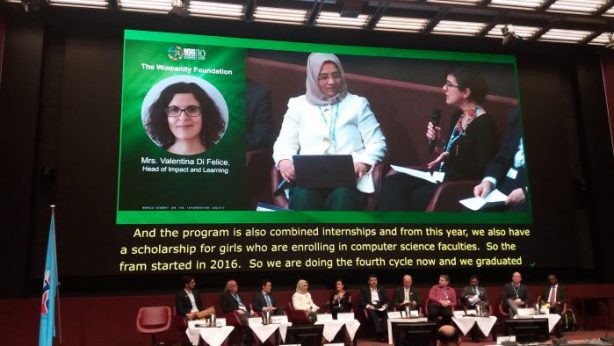STEM for gender equality
Balance for Better: STEM for gender equality
Globally, women are underrepresented in STEM. According to UNESCO, just 29% of those in science, research and development are women, with a low of 19% in South and West Asia.
In Afghanistan in 2016, women’s participation in the labour force was only at 19% (UNESCO). The major barrier to their employment: lack of practical knowledge of technology skills. Computer skills are ranked at the top of the scale of future employment needs. But deep rooted stereotypes and long standing biases that women and tech do not mix keeps girls and women from accessing STEM roles.
But why does this matter? In a society where women are still expected to perform traditional duties and look after the household, STEM based jobs can offer the flexibility to work from home, and/or on freelance hours. With STEM roles behind the innovations of the future, women need to be part of their design to ensure they are safe and relevant for all citizens.
Enter Girls Can Code (GCC), a Womanity project in Afghanistan that provides school girls the opportunity to learn programming and coding skills, thus becoming economically and socially empowered.
Girls Can Code: Addressing the skills gap
Womanity has been working in Afghanistan for over 10 years. Much of the focus has been on improving girls’ education and creating quality learning environments in which girls can succeed. In recent years however, this has shifted to providing school girls with the skills needed to pursue careers in STEM-related fields.
STEM-related jobs are growing at rate of 1.7 compared to other jobs, and pay 33% more. Womanity’s Girls Can Code programme works to improve students’ ability to participate in this growing employment market. The 3-year long programme, launched in 2017, currently runs in four schools in Kabul for girls aged 16-19 years old. Students are taught coding skills such as HTML and Javascript amongst others, as well as English language skills and basic computer literacy.
More than just coding
At the end of the programme students build a website from scratch and can apply for internship opportunities that are set up with local companies. As well as the practical skills this provides, it also showcases the benefits of the programme to the wider community, helping to shift attitudes.
Marjan, a GCC student, worked on the website for Al-Hayat Hospital. Upon its completion, CEO said: “Marjan, as leader of the team, demonstrated competence and dedication. The website is an informative website about our hospital. We will expand it in the future and we will want Marjan’s assistance for that. We encourage and recommend other institutions to partner with the GCC programme to design websites for their companies.”
Education Education Education
Whilst there is a long way to go to get more women into the workforce in Afghanistan, STEM provides a great opportunity to both economically and socially empower women as well as shift perceptions on the role of women in the workplace. But it all starts with education. If we can get more girls thinking seriously about STEM as a possible career, and encourage more companies to hire more women, we will get a step closer to the balance society needs.
Find more about Girls Can Code
Read about Girls Can Code Programme Director in this Q&A blog .


